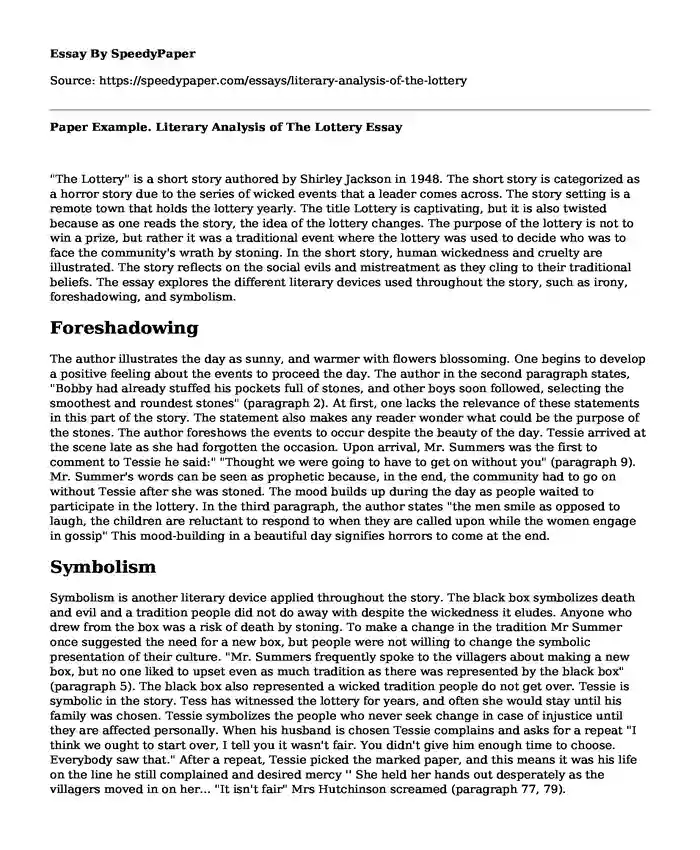
| Type of paper: | Creative writing |
| Categories: | Analysis Shirley Jackson The Lottery |
| Pages: | 4 |
| Wordcount: | 833 words |
"The Lottery" is a short story authored by Shirley Jackson in 1948. The short story is categorized as a horror story due to the series of wicked events that a leader comes across. The story setting is a remote town that holds the lottery yearly. The title Lottery is captivating, but it is also twisted because as one reads the story, the idea of the lottery changes. The purpose of the lottery is not to win a prize, but rather it was a traditional event where the lottery was used to decide who was to face the community's wrath by stoning. In the short story, human wickedness and cruelty are illustrated. The story reflects on the social evils and mistreatment as they cling to their traditional beliefs. The essay explores the different literary devices used throughout the story, such as irony, foreshadowing, and symbolism.
Foreshadowing
The author illustrates the day as sunny, and warmer with flowers blossoming. One begins to develop a positive feeling about the events to proceed the day. The author in the second paragraph states, "Bobby had already stuffed his pockets full of stones, and other boys soon followed, selecting the smoothest and roundest stones" (paragraph 2). At first, one lacks the relevance of these statements in this part of the story. The statement also makes any reader wonder what could be the purpose of the stones. The author foreshows the events to occur despite the beauty of the day. Tessie arrived at the scene late as she had forgotten the occasion. Upon arrival, Mr. Summers was the first to comment to Tessie he said:" "Thought we were going to have to get on without you" (paragraph 9). Mr. Summer's words can be seen as prophetic because, in the end, the community had to go on without Tessie after she was stoned. The mood builds up during the day as people waited to participate in the lottery. In the third paragraph, the author states "the men smile as opposed to laugh, the children are reluctant to respond to when they are called upon while the women engage in gossip" This mood-building in a beautiful day signifies horrors to come at the end.
Symbolism
Symbolism is another literary device applied throughout the story. The black box symbolizes death and evil and a tradition people did not do away with despite the wickedness it eludes. Anyone who drew from the box was a risk of death by stoning. To make a change in the tradition Mr Summer once suggested the need for a new box, but people were not willing to change the symbolic presentation of their culture. "Mr. Summers frequently spoke to the villagers about making a new box, but no one liked to upset even as much tradition as there was represented by the black box" (paragraph 5). The black box also represented a wicked tradition people do not get over. Tessie is symbolic in the story. Tess has witnessed the lottery for years, and often she would stay until his family was chosen. Tessie symbolizes the people who never seek change in case of injustice until they are affected personally. When his husband is chosen Tessie complains and asks for a repeat "I think we ought to start over, I tell you it wasn't fair. You didn't give him enough time to choose. Everybody saw that." After a repeat, Tessie picked the marked paper, and this means it was his life on the line he still complained and desired mercy '' She held her hands out desperately as the villagers moved in on her... "It isn't fair" Mrs Hutchinson screamed (paragraph 77, 79).
Irony
The story also has of irony starting from the title "the lottery" One thinks that the lottery is a good thing every person would desire to have. Still, in reality, the lottery was engraved by a multitude of social evils. The irony, in this case, the lottery that should be a good thing, is a representation of evil in the story. It is also ironic how the person who runs the lottery also participates in the lottery. "The night before the lottery, Mr Summers, and Mr Graves made up the slips of paper and put them in the box" (paragraph 8). Mr Summers and his assistant are responsible for preparing the materials in use and their being participants gives them a chance to join in foul play by plotting ways to pick the right lottery. When Tessie is chosen, his husband, Bill does not defend him. Bill went to his wife and held the paper high as its stated in paragraph 72 " Bill Hutchinson went over to his wife and forced the slip of paper out of her hand it had a black spot on it...Bill Hutchinson held it up". You would think someone who you helped would come for your rescues, but in this case, the bill proved it was every man for his own. Family ties could not stop the wickedness brought by the lottery.
Bibliography
Jackson, Shirley. "The lottery." The New Yorker 26 (1948): 25-28.
Cite this page
Paper Example. Literary Analysis of The Lottery. (2023, May 02). Retrieved from https://speedypaper.com/essays/literary-analysis-of-the-lottery
Request Removal
If you are the original author of this essay and no longer wish to have it published on the SpeedyPaper website, please click below to request its removal:
- Free Essay on Philosophy Questions
- Religion Essay Example: Prayer in Silence
- Free Essay with a Discussion on Type 2 Diabetes in the United States
- Law Essay Sample on CARDWARE's Defenses
- Family and Addiction - Problem Solving Essay Example
- Podiatric Medicine Residency Application, Essay Sample
- Gender and Language Essay Example
Popular categories




